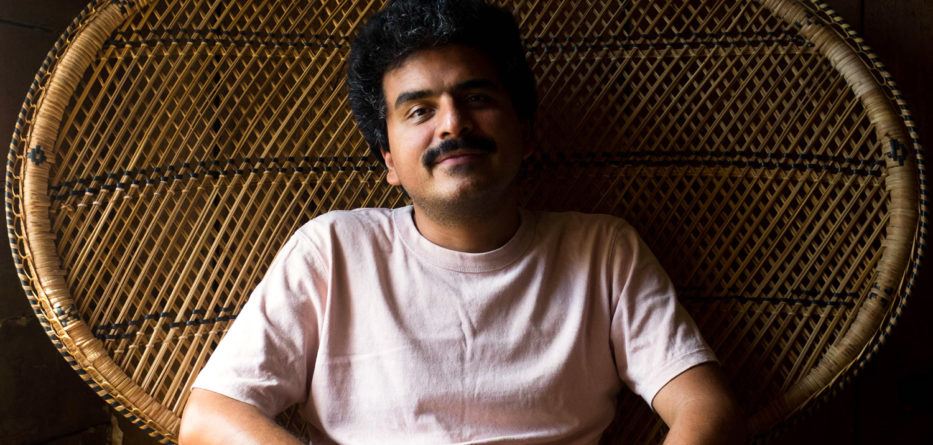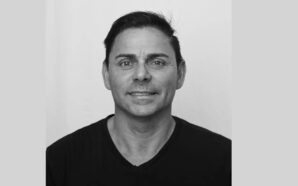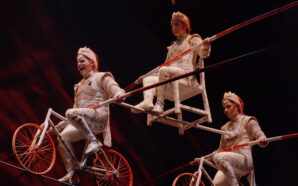Arturo Hilario
El Observador
I spoke to Roberto Carlos Lange recently, who goes by the name Helado Negro when he dives deep into the depths of his emotions and sound.
Based out of Brooklyn by way of Florida, the Ecuadorian American musician recently gave us some insight into the world of his art and how it feels to let out his home studio creations into the big bright world.
His music can be described with many terms: a path through dreaminess, spiritual, Latin, electro, Bossa Nova, pop & funk mixed with a variety of other sounds – that’s as close as I can attempt to get on the barometer of describing Helado Negro’s sound. (Best to just listen to it yourself).
And besides, Lange doesn’t really believe in filing himself in any one musical genre anymore. “Everything is kind of anything, you know. I think music doesn’t necessarily have any kind of specific genre identities anymore,” he says.
The lyrics of his bilingual music, he sings in English and Spanish, touch on things like nature, current inner thoughts and memory.
The following is a conversation ranging from Lange’s work as Helado Negro, the Latinidad and politics that permeate within his music and what he likes most about creating the pop-inspired tunes that gravitate a world full of bilingualism, heady feelings and a sound unlike any other.
Noise Pop Festival 2020 will host Helado Negro on Wednesday February 26 at the Great American Music Hall in San Francisco
I wanted to ask what your musical history was, in a sense. What are your strongest or earliest memories with music?
I think it’s hard because there’s so many things to pull from in my youth, in terms of like my parents influence that they were on me with the things that they’re interested in. I feel like it’s always curious you know, my parents are just like anyone else in terms of just enjoying the things that they enjoyed, whatever is on the radio. So, there wasn’t like a super hyper specialized musical background in my life. It was just like the things that they brought, my dad and my mom. There was like a lot of pop from Latin America and living in Florida there was a lot of Latin dance music, like Caribbean dance music.
So that those are like definitely like overarching like themes throughout my life, you know. But things that felt a little bit more formative were when I went to college and began like exploring just things that were just different, you know, that were like outside of that whole scope of like what people would call ‘things they identify [with] certain cultures’. And I think experimental music became like way more prevalent in my life.
I remember something that I was really into to the early days of college was this label out of Chicago called Thrill Jockey that became like a very important place for me to draw a lot of influences from. And I felt like that was really cool because one of the groups that I was really into was called Isotope 217° and the really cool thing about them was like all the people who played on that record played on so many other people’s albums, and it became a way to understand how all these people were interconnected to this community of music, you know.
And it made me aspire not only to just kind of like enjoy the aesthetic, but find people that we could find similarities in what we do, without it being like one type of music, you know?
How would you begin to describe your music?
Yeah, I don’t really necessarily have a kind of like catchall way to talk about it. I think it’s just mostly listening, like any music. I think it’s not important for me to try to describe it in a kind of palatable way. But I think for the most part, you know, just singing in English and Spanish, it is definitely a large aspect of what I do as Helado Negro but also having compositionally seeking an arrangement. I’m very much interested and influenced by like pop ideas, but things are just a little bit more, I would say, not so traditional and not so kind of straightforward.
I feel like at this point it’s like what is straightforward? I mean, everything is kind of anything, you know. I think music doesn’t necessarily have any kind of specific genre identities anymore. I think people just tend to, you know, just try to like align people with something because it’s something they had done or touched on. Like if an artist is in rap before, then they’re a rapper, you know, and I think that’s an unfortunate way to just align somebody.
So, your music is bilingual and you have songs like the more prominent, “Young, Latin and Proud” and “It’s My Brown Skin” which relate to Latinidad in its words, imagery and allusions. How important is that to come across in your music?
I think it’s important. It’s definitely important to me or I wouldn’t talk about it. I think the importance of it being in my music, it’s just something that comes out as expressiveness, things that I’m talking about through music, which a lot of times as a way better way to articulate feelings and emotions and things and experiences without having to distill it all into some kind of page-long thing about the experience and then be like, ‘Okay, well, this is, you know this is okay, this is cool’. But I think it through song and it’s something that I feel like I can use as a vehicle to talk about these things that I feel. And it’s not always about feelings or ideas of identity.
You know, sometimes it’s just rabbled up in what it’s like to be in New York when it’s cold as hell and laying up in a bed, you know? And all of its important to me. That’s how I view [it].
Touching om something related to the cultural aspect, when you’re making it is there like ongoing, political aspect to it? When you’re when you’re creating it, that comes out as, you know, like straight up in the lyrics, but in allusions and things like that.
Yeah, it’s hard not to notice and it’s hard not to care. And if you don’t care, I think it’s kind of a mystery to me when you do meet people who are ambivalent or possibly like nihilistic about [it]. Ultimately, I know I’m not doing all the right things. And sometimes you’re not able to do them all at the right time when it’s necessary. You can’t do other things you can do that are possible, because I think it’s just not always in the cards.
I think through the music, I try to put the intention out there of what I hope I can do for myself and do for other folks. And then, however they get portrayed or over even reflected back to me through folks who listen to it, I think that’s just kind of another perspective and interpretation. And I think it’s happened throughout different songs.
Like “Young, Latin and Proud”, that was a song without necessarily thinking about what it was. My intention with that song was deeply personal and it was something that was for me. When I toured during the record or when it came out, there was just a lot of feedback from people and it’s a really cool feedback loop because things get kind of cycled then recycled and interpreted in a completely different way; and how people talk about what it meant to them.
And beyond that, I mean, I think it just shows you that it’s a testament to why art is important, why music is important. And not necessarily about it being always political, but about it being inspirational. The things we draw inspiration from don’t necessarily always have to have deep underlying themes or tones, but I think the emotion and the sentiment can always be felt whether or not that’s what it’s about, you know.
Another thing I was curious about is whether you currently or have in the past created music not only as a creative way to process the experiences in your memory in my life, but as a way to create for other people? Or do you continue to make it for yourself essentially?
I think the hardest part is sharing. I think the easiest part is making something for yourself. Not easy, but easy to keep it in your world because you know that it’s just something that exists and you’re like, ‘Cool, this was for me and I made this, I’m excited’. But it lives around me. And I think then the hardest part about transitioning that work from this private world or private life to a shared place, it becomes harder because then it just gets into all these other ideas.
Just like this moment of self-criticizing because you’re just opening it up to people just even like commenting on anything. Not just folks who are listening, but even people who are like writing for newspapers or any kind of like music or art outlet. These things start building up and compounding into something that you’re like, ‘Oh wow, should I share this? Maybe this song isn’t good enough’, you know? Then you start doubting and thinking and overthinking about what you think it’s gonna be.
But I think that’s the hardest part so it’s not that you’re thinking about the song when you make it for somebody, for the world. I think it’s when you start thinking about sharing it, it’s like, ‘Oh, damn, is this something you really need to share?’
And I’m jumping off that. In your experience and making music and producing and all that, what would you say is your favorite aspect of it?
One of my favorite aspects of making music or working with music is [a] two part. I think it’s creating something out of nothing like at home or in the studio, or wherever I am. I think that’s like really exciting because you have this gratification from understanding where it’s begun to where you think it should be.
Then the other part is performance. I think some of the exciting moments of performance are having an interpretation of the songs, the performance in front of folks. It really gives me a lot of energy and understanding about what you’re doing with music and how it can be louder sometimes and how things that you think are so quiet can be like really impactful.
Now I wanted to ask you about your latest album, which is “This Is How You Smile”.
We also put out recently a live at KCRW vinyl that was [done] with a five-piece band that interpreted like five or six songs from the record as well. I think we made 500 records. So, it’s like super Limited edition.
Can you tell me a little bit about how long it took to craft, write etc.? What was your most recent experience in making this newest album? Like, where were your feelings at?
Yeah, for “This Is How You Smile” it took a lot of time. It was hard because I think I was like transitioning out of the amount of time that I had spent with “Private Energy”. It was hard because I wrote “Private Energy” in 2014 and I toured it in 2015 and then didn’t released it until 2016. So, I kind of lived with it for a really long time. And then in 2017, I was still touring a little bit, but I decided to just start working on something new. And then I realized it all in like 2018 and just work through that whole year. Then we finally started releasing stuff at the end of 2018, to have the record in 2019.
The whole process was a lot more studio oriented and unlike before where, you know, I’ve almost always worked at home and I share the space with my wife Kirsti Sword. It’s always been exciting because it’s cool to have a space that just flows from living and working. But it’s also kind of wild because I changed that dynamic by having like a more like, regimented schedule of like going to a studio in the morning and then taking a break in the afternoon and going to another studio at night for like five or six months.
Then it really, I think it informed the record a lot. It allowed it to be focused in a different way than I had focused before. It was exciting.
I really appreciate the time. Is there anything that you might want people to know that I haven’t been able to get to, or anything you’d like to add in?
I think mostly just about the KCRW record, I think was really exciting because I’ve had brief moments last year to have on different ensembles. I tour with a three-piece, it’s me and two other people. Then to have the ability to expand it is always exciting because it gives the music a whole other breath, and I think it’s a cool recording. So more than anything, I think it’s exciting to hear it if folks haven’t heard it yet.
Finally, you’re coming at the great American Music Hall with the Noise Pop 2020 festival later this month, and I was curious how you chose or ended up on the lineup with the other guests performing that night?
It’s, um, it’s always a different process. That night, I think the promoter was going to suggest or send some names. They did and it was cool because there are people that I already dug, and a couple of people I didn’t know. I didn’t know Trey Burt, so I thought that was cool. I think it’s always exciting to kind of even get turned on to something and have the opportunity to see if it’s something that you feel like will help be an interesting night for everyone.






